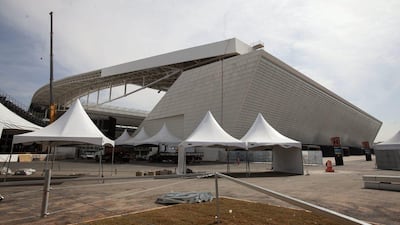SAO PAULO // Almost five months after Fifa’s deadline, the stadium that will host the World Cup’s opening match was yesterday formally handed over to football’s governing body. The delivery came less than 24 hours after the Arena Corinthians held its inaugural test event.
On Sunday, 36,000 spectators watched stadium-owning Corinthians play Figueirense, who started the day bottom of the Brazilian top-flight. With the visitors springing a surprise 1-0 victory, all of Brazil will now pray the next time a match is held here, the home side will triumph.
With Corinthians not playing again at their new home until after the World Cup, the next match scheduled to take place at the stadium is when Brazil meet Croatia on June 12 in the curtain-raiser of football’s grandest showpiece, the Fifa World Cup.
By then the arena will be operating at its full capacity of more than 65,000. Sunday’s match was a decreased capacity due to additional temporary stands not yet being complete. Parts of the stadium’s roof also remain unfinished and with a light shower turning into a hailstorm during the game, many of the fans retreated for cover at the rear of the stands.
Organisers confirmed earlier this week the roofing will only be finished after the World Cup, but Ricardo Trade, the chief executive of Brazil’s local organising committee, was in optimistic mood post-match on Sunday.
“There are still tweaks here and there, but we already knew that,” Trade said. “This test was to verify these things, but I would say it has been one of the best tests we have conducted. I was impressed with the sound, the lighting, the pitch, the screens...”
The Arena Corinthians, which broke ground in 2011, was due to be finished by the end of last year, but has suffered multiple delays. In November, two construction workers died when a crane collapsed, resulting in work being halted. A third death occurred two months ago when a worker fell 25 feet while installing flooring on a temporary stand. Again, work was stopped.
With the two additional 10,000-seat stands not being in operation on Sunday, the World Cup will be the first time they will be used. Thiago Paes, the local organising committee’s stadium operations manager, said it was no cause for concern.
“The tests have all been made,” Paes said. “We did the weight test and everything is all right. We are sure that everything is working perfectly.”
Outside the stadium, the area surrounding the arena remains largely incomplete, particularly the infrastructure aimed at making public access easier. The bus terminal is unfinished, while many of the roads remain without tarmac. A lack of exterior lighting around the venue left many fans walking through puddles in the dark.
“I am a Corinthians fan, so it is no surprise that I think the stadium is fantastic,” said Samara Brochado, a Sao Paulo native who attended the match with her brother. “It is all black and white, so feels like our home. But my honest opinion is that there is no chance everything will be 100 per cent finished in time for the World Cup.”
In the stadium’s interior, several rooms were awaiting carpets, a sprinkler was leaking water, light-fittings hung loose and the elevators were programmed incorrectly, taking users to the wrong floors. A Brazilian photographer had a suitcase with two camera lenses and a flash stolen from the media centre.
Brochado added: “Eight days ago, I came to a Corinthians exhibition event here and even since then some things have improved. If in eight days many things can be improved, I think in four weeks we can hope for the surrounding area to be 90-95 per cent complete.”
The arena will host six matches in total, including the opening game and a semi-final. It was initially expected to cost R$350 million (Dh585m), but the final figure is closer to R$1.1 billion (Dh1.98bn). Corinthians were given financial help courtesy of tax breaks and government loans. Sunday’s match proved the most profitable in the club’s 104-year history, raising more than R$3 million (Dh4.9m).
Sunday’s test event also means all 12 of Brazil’s stadiums have now been inaugurated, although none have been tested at full capacity. Cuiaba’s Arena Pantanal held its first test this weekend, while Arena da Baixada in Curitiba held its final test event last week.
gmeenaghan@thenational.ae
Follow us on Twitter @SprtNationalUAE

